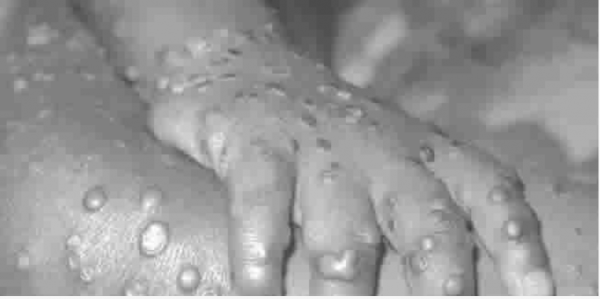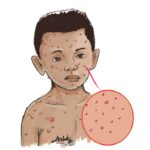
by Judd-Leonard Okafor, Abuja & Doyin Adebusuyi, Ado Ekiti
The poxes: there’s small, there’s chicken. And now there’s monkey-and it is scaring the living daylights out of Nigerians. Don’t even mention cowpox or horse pox.
The first cases were discovered in Bayelsa. On September 22, health officials there notified the Nigeria Centre for Disease Control of a strange illness in an 11-year-old boy. That was at Niger Delta University Teaching Hospital, Yenagoa.
He had a skin rash similar to small pox or chicken pox. It couldn’t possibly be either: chicken pox has a vaccine and one infection confers immunity; small pox has had a vaccine since 1798.
The 11-year-old was part of the first two clusters of infection among some six people. Another cluster of five patients include a health worker who managed one of them.
A total 11 other people with similar symptoms were identified.
Epidemiologists between the NCDC and Bayelsa pored over the symptoms. Every clinical finding suggested a disease reported only once in Nigeria-back in the 1970s. Monkey pox.
Epidemiologists were quite sure it was monkey pox, but still sent off samples for confirmation at World Health Organisation reference laboratory hosted in Dakar, Senegal.
The results were yet to show up. But epidemiologists were sure they had nailed the symptoms to the right disease. They okayed Bayelsa health commissioner to go public.
By first week of October, officials had identified and were tracing 32 people who may have had contact with any of those infected and hospitalized.
Since then Nigerians have been a-tizzy over the “new” outbreak. Illustrative photos were dug up online to portray the most visible symptoms-the unsightly skin rash.
“The picture is very gory, very irritating,” Abigail Essien complained about the photo. Told it was to draw attention and make people want to read about monkey pox, she retorted, “I even prefer reading about Ebola that monkey pox, even though Ebola is deadlier.”
At its height, Ebola in the first outbreak in West Africa, ravaged Guinea Sierra Leone and Liberia, killing more than 11,000 people within months in 2014.
Lassa fever has killed hundreds in Nigeria alone-98 dead so far this year from 837 suspected infections this year alone. It has also established a pattern of seasonal outbreaks nearly every year since it was first discovered
And meningitis outbreak topped 9,799 cases, with 602 deaths.
All have fatality ratios far higher than monkeypox. In the last cluster of the disease in the 1970s, fatality ratio was 5%–meaning only five in 100 people who caught the infection would have died.
“It doesn’t have to be,” says NCDC chief executive Chikwe Ihekweazu. “If the cases are well managed, detected early, the chances are they will survive.”
Link to animal kingdom
Other than meningitis, Ebola and Lassa fever stand out with monkey pox for being zoonoses-diseases that can move between humans and animals. One running meme on social media asks what Nigeria has done to offend the animal kingdom.
But that’s where the joke stops. Typically viruses that live in animals circulate in animal populations for long. Periodically, they jump into human populations.
That’s exactly what happened with the current monkey pox. And it isn’t just the name thing. Epidemiologists taking history of the 11-year-old have confirmed contact with a monkey.
Only samples from both the boy and monkey can show if the viruses are the same, but the monkey isn’t around anymore.
The virus may be named monkey pox virus, but it doesn’t live in only monkeys. Rats, squirrels, general wild game carry it too. And wild game of different kinds are delicacies across Africa, which is how the Ebola outbreak began-through contact with animals.
A public health advisory warns of contact with animals, but that doesn’t mean banishing your pets. More it means handle with care.
“The period of increased risk is at the point of killing. But the eating is not a problem,” says Ihekweazu.
“Once you eat well-cooked or -fried meat, you are perfectly fine. It is the people that actually touch these animals, prepare them, kill them and are in contact with them without personal protective equipment and don’t wash their hands afterward.”
That’s how monkey pox jumps from animal vectors to human hosts. A bite or scratch from an infected animal or preparing bush meat can get the virus into a human.
Once in a human, it gets to other humans through respiratory droplets, contact with infected persons or contaminated materials.

A rash of infections
Epidemiologists did the leg work to gather information and certainty before going public with monkey pox. NCDC also issued control measures for the public and health workers.
It warned for suspected or confirmed cases to be isolated, called for strict adherence for universal precautions, and advised frequent handwashing with soap and water and use of personal protective equipment.
But it was the start of a rash of cases. The infection spread to six more states after Bayelsa only days later.
Two cases were reported in Lagos, and officials there raised their “index of suspicion”-essentially thinking about the possibility of monkeypox when dealing with any fever and decking out in available protective gear.
Of the two cases under watch for monkey pox, one is confirmed to have visited Bayelsa and eaten “bush meat,” Lagos health commissioner Jide Idris told a press briefing.
Hours later, the NCDC confirmed Rivers, Ekiti, Akwa Ibom, Ogun and Cross River were also among states scrambling with suspected monkey pox.
All decisions were based on clinical observations; laboratory confirmation from the WHO regional lab is yet to return.
The confirmation meant 31 people hospitalized in respective states, later to rise to 33 days later.
Two other infections reported in Ekiti can also not be confirmed yet. Both were recorded in Okemesi Ekiti, a border town with Osun State in Ekiti West Local Government.
Ekiti instead sent blood samples to Abuja, said its health commissioner Ojo Olurotimi.
“We are still expecting the result,” he added. Meanwhile both patients remain in isolation to avoid further spread.
Fighting fake news
An emergency operations centre activated to coordinate investigation and response to the outbreak across all states. But a notification for “preparedness” has been issued for the entire country.
States yet to report any possible cases are gearing up for possibilities. Edo has opened quarantine centres and published numbers of two top public health officials are hotlines where the Edo residents can report any possible symptom of monkey pox.
The state health ministry is to reactivate an old centre on the slope of Ikpoba hill to be used as a dedicated “situation room”.
Residents have been warned to be “circumspect but calm.”
Ogun has argued against NCDC listing it among the seven states reporting monkey pox. Its health commissioner Babatunde Ipaye said an “overzealous official” noticed lesions on a patient and ran off to report to the NCDC even before Ogun state officials could conclude examination.
States are also scrambling to fight fake news. Parents scrambled this week to drag their children from school in Anambra after social media posts alleged children were being vaccinated.
It came after previous posts that the outbreak of monkey pox in Bayelsa was the result of intentional injections meant to reduce the region’s population.
The information minister debunked it, but it didn’t stop parents. The army has had to officially declare the immunisation was part of its corporate social responsibility for the regions where its Operation Python Dance II runs.
Now health officials may have a problem ahead-with getting parents to let their children get immunisation as a massive measles vaccination campaign starts this October.
And Thursday came with fresh allegation of two possible monkey pox infections at a district hospital in Abuja. The pox turned out to be only chicken pox, not monkey.
“I think I like the suspicion because it’s better to suspect than to ignore it and it later turns out to be positive,” said Humphrey Okoroukwu, director of public health in the Federal Capital Territory.
“The truth now is that there is no confirmed case of monkey pox disease in FCT,” he said.
Self limiting
“We are happy that the NCDC is coordinating investigation and response across the affected states through active case finding, epidemiological investigation and contact tracing,” said Diana Eyo-Enotte, programme director for Envision Global Care Foundation.
“However we should see it that the swift spread of the virus to seven states in less than a month means that Nigerians are not properly educated about the virus and how it spreads, most of which are due to body contact attributed to environmental and poor living condition of the people.
“At this point, monkey pox should be declared a serious medical emergency and the government must pay full attention to it by providing both human and financial resources to contain its spread,” she added.
Like many viral diseases, monkey pox is self limiting. Basically, it has no specific cure and potentially wears itself out, once it is discovered early on and treatment starts.
The treatment involves supportive care and management of the symptoms. In time patients recover. Five patients hospitalized in Bayelsa have recovered and been discharged from hospital, reports said Thursday.
But one concern remains-and it is cosmetic. It is fear for the sight of the rash that’s turned people to read about it-and turned others away from it entirely.
Halima Sadiya shudders to think of it. “I am afraid of monkey pox, because of how my skin would look. I can’t look at myself in the mirror,” the mother of one says.
There is one benefit to catching monkey pox. Successful treatment confers immunity, which basically renders a patient immune in case of future outbreaks.
“There is no serious aftermath apart from one, and it is aesthetic,” says Ihekweazu.
“You stay with the scars of the rash for quite a while. If you are a child, it is most likely they will disappear with time. As an adult it is a little bit more tricky. So the biggest challenge is the appearance problem, so it is something we have take very serious, because it leads to stigma. We have to support patients, assure them that even if there is some scarring on their faces, there is no long-standing physical outcome to worry about.”

 Join Daily Trust WhatsApp Community For Quick Access To News and Happenings Around You.
Join Daily Trust WhatsApp Community For Quick Access To News and Happenings Around You.


